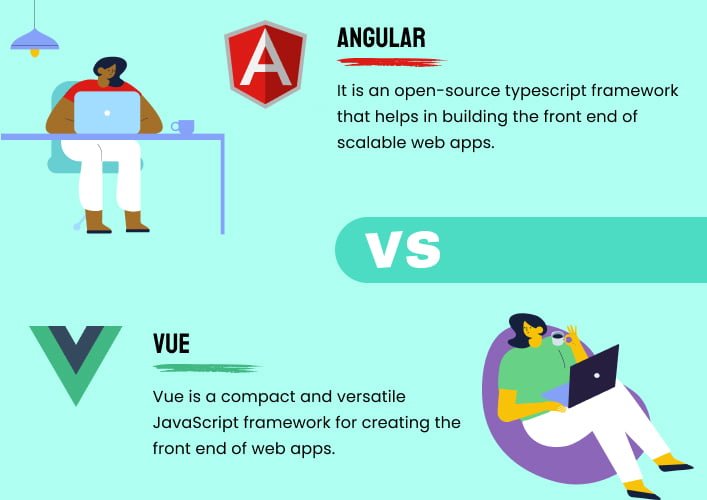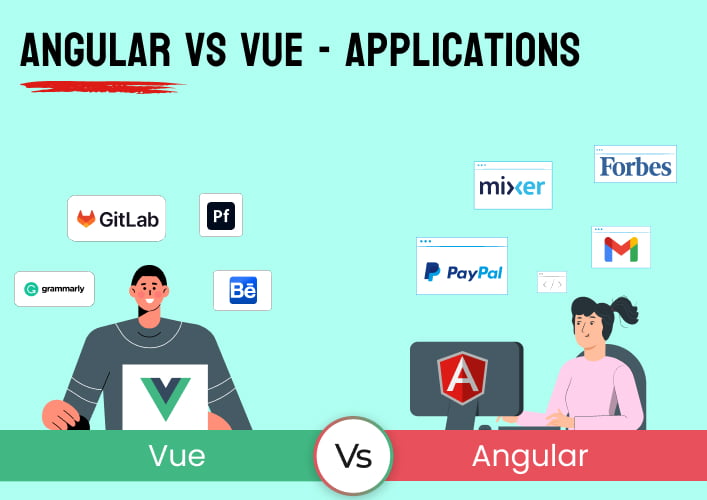Angular vs Vue – Introduction

- Angular : It is an open-source typescript framework that helps in building the front end of scalable web apps. It was released by Google. It helps in building SPAs with HTML and Typescript. Thanks to its flexibility and ability to be adapted to any platform, it opens up new possibilities for the development of the front end of web applications.
- Vue : Vue is a compact and versatile JavaScript framework for creating the front end of web apps. Vue is an adaptable and forward-thinking JavaScript framework since it enables the development of progressive Interfaces without compromising the stability of the underlying application. Decoupling components in Vue makes it possible to add new features and capabilities to a web project.
Angular vs Vue – Popularity
Following the stats of W3 techs, Angular is used by 0.6% of the websites they have the data of. Majoritively, Angular is used by high-traffic sites. While Vue is used by 1.0% of the website. Thus, you can think that Vue is used more than Angular. Furthermore, if we see their popularity on GitHub, the Angular repository has 23.4k forks and 87.5k stars whereas the Vue repository has 33.6k forks and 203k stars. Therefore, the GitHub community of Vue is bigger than Angular.
Angular vs Vue – Advantages
| Angular | Vue |
|---|---|
| The source language is Typescript in Angular. | The source language of Vue is Javascript but it also supports typescript. |
| Agular is compressed and acquires space of 563kB. | vue is gzipped and acquires 33.5kB. |
| Its enhanced navigation and auto-completing features make it perfect for developing enterprise apps. | Writing boilerplate code is easy in Vue which makes the development process faster. |
| Updates of Plugins and dependencies are recommended on a regular basis. | Vue is becoming faster and more lightweight with every update. |
| Its features like Ivy renderer, differential loading, AOT compiler, etc provide excellent results. | Developers don’t have to spend their time fixing bugs and fine-tuning code. They can concentrate on developing new features. |
| The framework makes it simple to incorporate other third-party apps, giving developers additional options and resources to work with. | Vue provides a set of additional API capabilities based on functions, allowing for the wide and versatile creation of component logic inside an app. This makes it easier to understand and add functions to parts of an app. |
Angular vs Vue – Disadvantages
| Angular | Vue |
|---|---|
| If you are migrating from the old version of Angular, it takes a lot of time. | There are lots of issues with mobile support. |
| It is way too complex and verbose for developers to develop small apps. | Two-way binding is difficult in Vue. |
| It is a heavy framework. | It lacks scalability. |
Angular vs Vue – Applications

Developers can use Angular to develop eCommerce sites, Video streaming apps, user-generation content sites, blogging websites, real-time apps, PWAs, SPAs, gaming apps, cloud computing apps, native mobile apps and more. Some leading apps that were built using Angular are PayPal, Gmail, Forbes, and Mixer.
With Vue, developers can create small-scale apps, SPAs, PWAs, and enterprise apps, and upgrade or expand existing apps. Popular apps built using Vue are Gitlab, Grammarly, Behance, and Adobe Portfolio.
Angular vs Vue – Performance

Among all the frameworks, Angular has shown itself to be particularly helpful in achieving top-notch results. You would be knowing that the performance depends on DOM. Since Angular uses the real DOM, the complete web/app page is re-rendered whenever a component is modified. Furthermore, with Ivy renderer, apps are built in a way that performance is lightning-fast taking less development time.
On the other hand, Vue grows more unstable when new features are introduced or components are expanded, making it more difficult to achieve optimal loading times. Vue utilizes virtual DOM which renders real DOM whenever a component is modified. Thus, the app performance is boosted. The lazy loading of Vue is a highlight feature. It speeds up the process of loading the page.
Angular vs Vue – Scalability
In this round of Angular vs Vue, Angular wins as its scalability is higher than Vue. For more complex systems, for the components to keep expanding, the appropriate response in Angular is to break them down into more manageable chunks. Thus, it can easily create large-scale and complex applications. While Vue is flexible but is majoritively used for small-scale apps. The one potential negative is that Vue’s ability to scale may need more involved methods, such as forking, splitting repositories, and employing individual plugins.
Conclusion
Whenever you choose keep in mind that the right framework will help you to develop your project in time. As both frameworks have their own pros and cons, you can choose one on the basis of project requirements. In case you want to build large-scale projects, Angular will be a perfect choice else you can choose Vue. Furthermore, if you have a small team and less time to develop SPAs or web apps, you can use Vue else to build a scalable app you must choose Angular. Still, if you are confused about choosing a front-end framework, book a FREE consultation with us. We offer technical consulting and can connect you with developers that are proficient in Angular, Vue, and other leading technologies.
FAQs
Is Vue better than Angular?
Is Angular faster than Vue?
Does Google use Vue?
Angular vs Vue, which is more popular?
Does Zoom use Vue?
Ravi Bhojani is the Chief Marketing Officer (CMO) at Alian Software, where he spearheads the company’s marketing strategies and drives its brand presence in the competitive IT services landscape. With over a decade of experience in the technology and marketing sectors, Ravi has consistently demonstrated his ability to blend innovative marketing techniques with deep industry knowledge to deliver outstanding results.